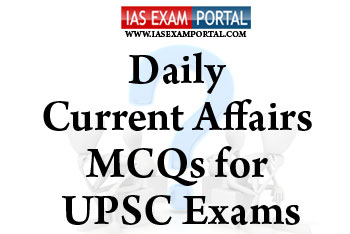Current Affairs MCQ for UPSC Exams - 24 October 2018
Current Affairs MCQ for UPSC Exams - 24 October 2018
Q1. Which of the following statements regarding National Board of Wildlife are true ?
1) The NBW is a “Statutory Organization” constituted under the Wildlife
Protection Act, 1972.
2) it serves as apex body to review all wildlife-related matters and approve
projects in and around national parks and sanctuaries & No alternation of
boundaries in national parks and wildlife sanctuaries can be done without
approval of the NBW.
3) the board has the powers of a civil court.
a) 1 & 2 only
b) 2 & 3 only
c) 1 & 3 only
d) all of the above
Q2. Consider the following statements regarding recently launched “Main Nahin Hum” Portal :
1) The portal, will enable IT professionals and organizations to bring
together their efforts towards social causes, and service to society, on one
platform.
2) the portal is expected to help catalyse greater collaboration towards the
service of the weaker sections of society, especially by leveraging the benefits
of technology.
3) It is also expected to generate wider participation of interested people who
are motivated to work for the benefit of society.
Which of the above statements are true ?
a) 1 & 2 only
b) 2 & 3 only
c) 1 & 3 only
d) all of the above
Q3. Which of the following animals can be seen in the arctic tundra climate zones?
1) Lemmings
2) Musk oxen
3) Polar bears
4) Arctic wolves
5) Adelie penguin
a) 1,2& 3 only
b) 3,4& 5 only
c) 1,3 & 5 only
d) all of the above
Q4. Which of the following facts about coral reefs are not true ?
1) Coral reefs are one of the most biodiverse marine areas on the planet .
2) They eat microplastics, and they like them.
3) Coral reefs are important to the development of new medicines.
4) Corals are also a species of plants & they rely on photosynthesis to survive.
a) 1,3& 4 only
b) 2,3 & 4 only
c) 1,2& 3 only
d) all of the above
Q5. “Gender Inequality Index” is released by which of the following global institutions/programmes ?
a) UNESCO
b) UN development programme
c) International Monetary Fund
d) World Economic Forum


